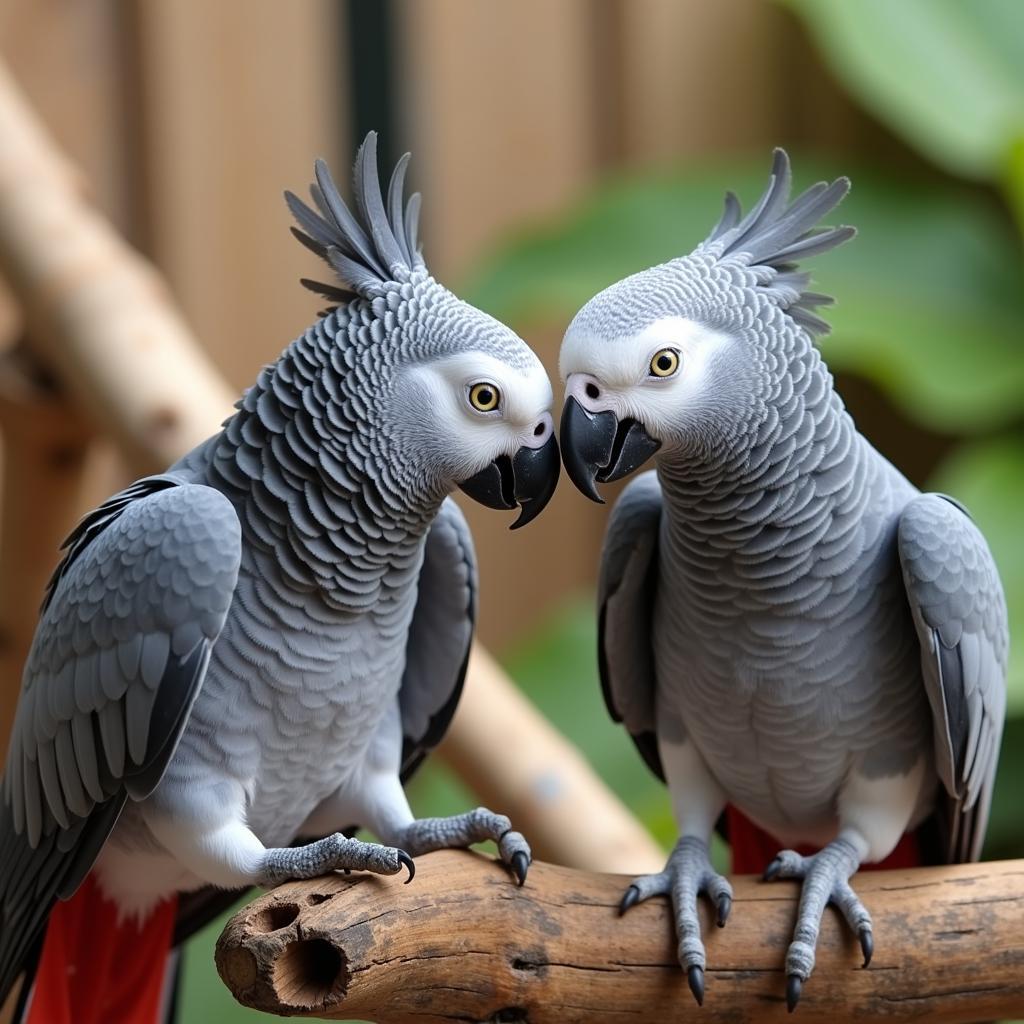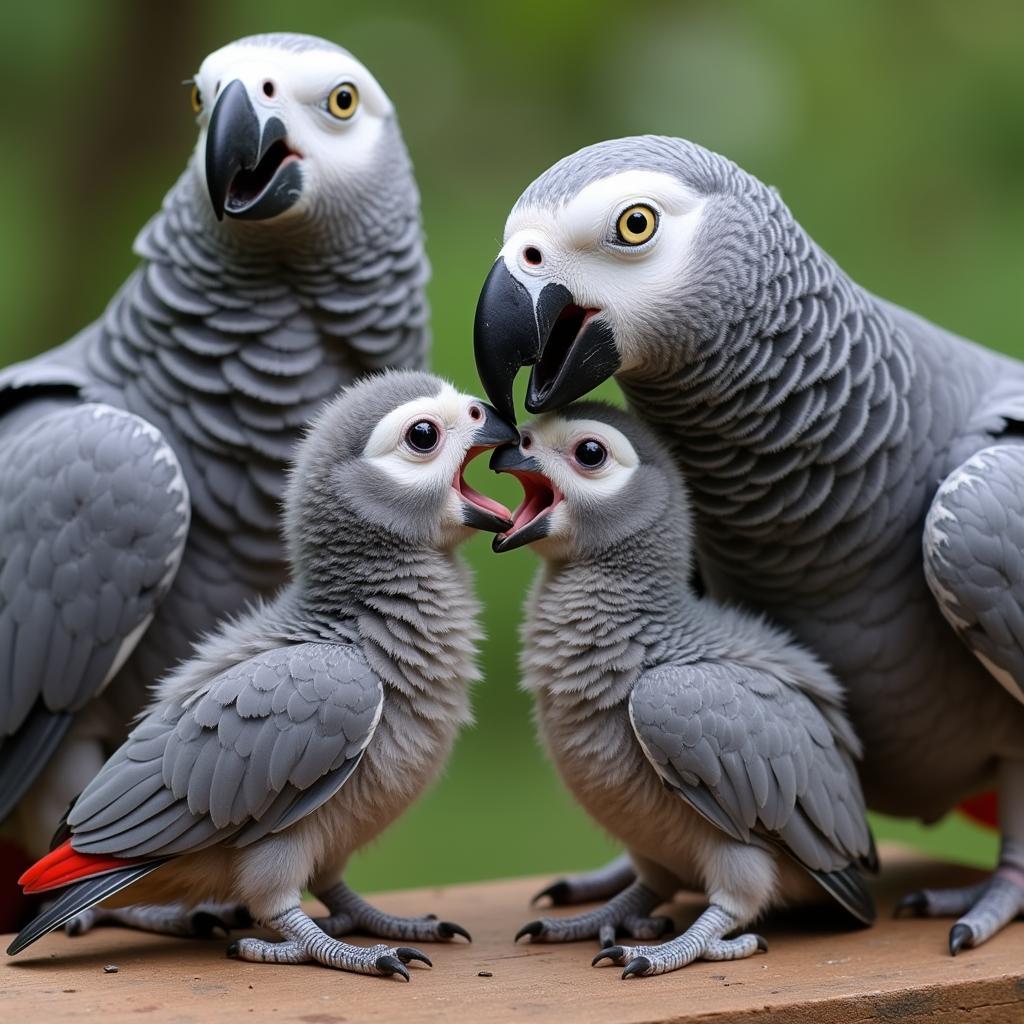Understanding African Grey Breeding Behavior
African Grey Breeding Behavior is a fascinating subject, offering insights into the complex social lives and reproductive strategies of these intelligent birds. Understanding these behaviors is crucial for anyone considering breeding African greys, ensuring the well-being of the birds and the success of the breeding process. This article delves into the intricacies of African grey breeding, covering everything from courtship rituals to nesting habits and chick rearing. After reading this, check out more about african grey parrot mating.
Courtship and Pair Bonding in African Greys
African grey parrots form strong pair bonds that can last a lifetime. Courtship involves a series of elaborate displays, including head bobbing, wing flapping, and mutual preening. These rituals strengthen the bond between the pair and signal their readiness to breed. The male often regurgitates food for the female, a sign of affection and commitment.
 African Grey Parrots Engaging in Courtship Rituals
African Grey Parrots Engaging in Courtship Rituals
Vocalizations also play a significant role in courtship. The pair will engage in duets, mimicking each other’s calls and creating a unique “language” that reinforces their bond. Observing these intricate interactions provides valuable insights into the complex social dynamics of these intelligent birds.
Nesting and Egg Laying
In the wild, African greys typically nest in tree cavities. In captivity, they require spacious nesting boxes that mimic their natural environment. The female will lay 2-5 eggs, typically one every other day. She will then incubate the eggs for approximately 28-30 days, while the male provides food and protects the nest.
Chick Rearing and Parental Care
Once the chicks hatch, both parents share the responsibility of feeding and caring for them. The chicks are initially covered in white down, which gradually gives way to their characteristic grey plumage. They remain in the nest for around 10-12 weeks, during which time they learn essential survival skills from their parents. Learn more about breeding specifics in our african grey parrot breeding behavior article.
What to Expect During the Chick Rearing Phase
During the chick rearing phase, expect increased vocalizations from both parents and chicks. The parents will be busy bringing food to the nest and keeping the chicks warm. It’s crucial to provide a quiet and undisturbed environment during this period to minimize stress on the family.
Factors Influencing African Grey Breeding Success
Several factors can influence the success of African grey breeding, including diet, environment, and the overall health of the breeding pair. A balanced diet rich in fruits, vegetables, and high-quality pellets is essential for healthy reproduction. Maintaining a proper temperature and humidity level in the breeding environment is also crucial.
 African Grey Parrot Chicks Being Fed by Parents
African Grey Parrot Chicks Being Fed by Parents
Conclusion
Understanding African grey breeding behavior is crucial for successful breeding. From the intricate courtship rituals to the dedicated parental care, the breeding process offers a fascinating glimpse into the complex lives of these intelligent birds. By providing the right environment and care, breeders can contribute to the conservation of this remarkable species. Remember, successful breeding relies on understanding these beautiful creatures’ needs. Learn about gender identification in our article on african gray parrot male or female.
FAQ
- How long do African greys live? African greys can live for 50-80 years in captivity.
- When do African greys reach sexual maturity? Typically between 4-6 years of age.
- How often do African greys breed? Usually once or twice a year.
- What is the ideal temperature for breeding African greys? Around 75-80°F (24-27°C).
- How can I tell if my African greys are bonded? They will exhibit mutual preening, regurgitation, and close proximity.
- What should I feed my breeding African greys? A balanced diet with plenty of fruits, vegetables, and high-quality parrot pellets.
- How long do African grey chicks stay in the nest? Approximately 10-12 weeks.
Scenarios
-
Scenario: You notice your African Greys exhibiting courtship behaviors but they are not mating.
- Possible Solution: Check their diet, ensure their environment is suitable for breeding (proper nesting box, temperature, and humidity), and consult a veterinarian to rule out any underlying health issues.
-
Scenario: Your African Grey has laid eggs but is not incubating them.
- Possible Solution: Check the temperature and humidity of the nesting box, ensure the eggs are fertile, and consider providing a foster parent or artificial incubation.
-
Scenario: The African Grey chicks are not thriving.
- Possible Solution: Consult a veterinarian immediately, ensure the parents are providing adequate care and feeding, and adjust their diet if necessary.
Further Reading and Resources
Are you interested in learning more about African bird traps? Visit our page on african bird trap. For information on reputable breeders in Ohio, check out african grey parrot breeders in ohio.
Contact Us
When you need support, please contact us at Phone Number: +255768904061, Email: kaka.mag@gmail.com, or visit our address: Mbarali DC Mawindi, Kangaga, Tanzania. We have a 24/7 customer support team.



